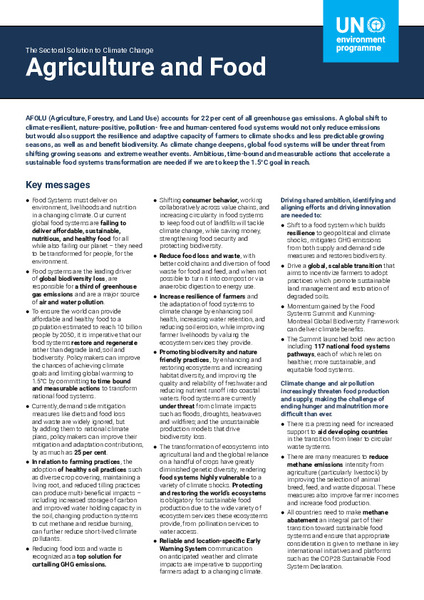| dc.contributor | Industry and Economy Division | en_US |
| dc.contributor.author | United Nations Environment Programme | en_US |
| dc.coverage.spatial | Global | en_US |
| dc.date.accessioned | 2024-06-19T11:30:53Z | |
| dc.date.available | 2024-06-19T11:30:53Z | |
| dc.date.issued | 2024-06 | |
| dc.identifier.uri | https://wedocs.unep.org/20.500.11822/45765 | |
| dc.description | AFOLU (Agriculture, Forestry, and Land Use) accounts for 22 per cent of all greenhouse gas emissions. A global shift to climate-resilient, nature-positive, pollution- free and human-centered food systems would not only reduce emissions but would also support the resilience and adaptive capacity of farmers to climate shocks and less predictable growing seasons, as well as and benefit biodiversity. As climate change deepens, global food systems will be under threat from shifting growing seasons and extreme weather events. Ambitious, time-bound and measurable actions that accelerate a sustainable food systems transformation are needed if we are to keep the 1.5°C goal in reach. | en_US |
| dc.format | pdf | en_US |
| dc.language | English | en_US |
| dc.rights | Public | en_US |
| dc.subject | agriculture | en_US |
| dc.subject | food loss | en_US |
| dc.subject | food consumption | en_US |
| dc.subject | food industry | en_US |
| dc.subject | climate change adaptation | en_US |
| dc.subject | climate change mitigation | en_US |
| dc.subject | administration | en_US |
| dc.subject | food | en_US |
| dc.subject | drinking water | en_US |
| dc.title | Sectoral Solution to Climate Change: Agriculture and Food | en_US |
| dc.type | Factsheets, Infographics and Brochures | en_US |
| wd.identifier.sdg | SDG 2 - No Hunger | en_US |
| wd.identifier.sdg | SDG 13 - Climate Action | en_US |
| wd.topics | Climate Action | en_US |
| wd.topics | Finance and Economic Transformations | en_US |
| wd.identifier.pagesnumber | 2 p. | en_US |


